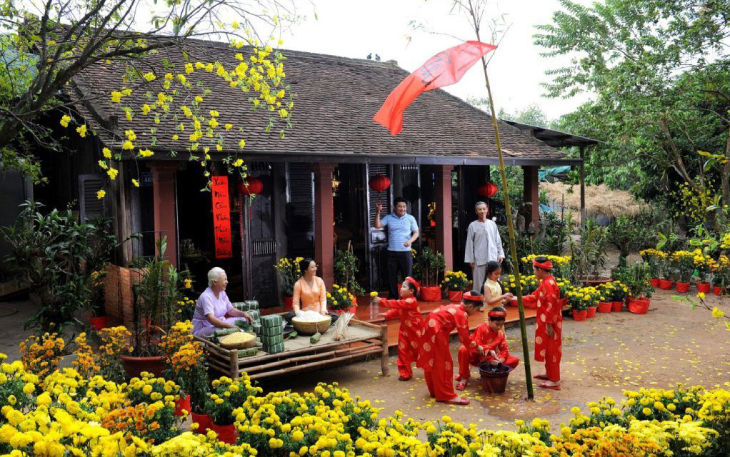| – Name: | Tet nguyen dan (Lunar new year) |
| – Type of festival: | National traditional festival |
| – Time: | From the 30th day of the twelfth lunar month to the 4th day of the first lunar month. |
| – Place: | Families, places of worship (pagoda, village hall, family village hall, etc) and other places of interest. |
| – Subject: | Ancestor |
| – Activities | + Kitchen God offering, reunion dinner, giao thua offering, etc. |
| + Visit relatives and friends, send wishes, go to pagoda, go to cemetery and participate in traditional games. |
“Tet Nguyen Dan”, also called “Tet” for short is an important traditional cultural event. Every year, “Tet” takes place from the 1st day of the first lunar month. Locals are off from work from the 30th day of the twelfth lunar month to the 1st day of the first lunar month.

In Sino-Vietnamese, “Tet” originated from “節” (weather) which means the changing of seasons spring – summer – autumn – winter. “Nguyen” means the beginning while “dan” means the early morning. Tet Nguyen Dan means the first morning of a lunar year.
When “Tet” is in the air, people are busy with shopping, cleaning, decorating and preparing traditional dishes. At this time of the year, those living far away from home look forward to returning and reuniting with their families. For this reason, “Tet nguyen dan” is said to be an occasion for families.
Today, Hue, the ancient capital of Vietnam is still home to many traditional “Tet” practices.
Kitchen God offering: Vietnamese believe that every 23rd day of the twelfth lunar month, the Kitchen God is back to the heaven and report things happen during the year. For this reason, Vietnamese carefully prepared a ceremony to bid farewell to the God.
Union dinner: it is a familiar ceremony to mark the end of the year and welcome a new year. Based on their financial condition, families prepare the offering to invite god, ancestors home for Tet holiday on the 30th day of the twelfth lunar month. However, incense, votive paper, candle, betel, areca, wine, ect are must-have items.
Countdown offering: It is held at 11:00 pm of the 30th day of the twelfth lunar month to 1:00 am of the 1st day of the first lunar month. It is an important ceremony held before Tet officially begins. This solemn ceremony consists of two separated offering trays. One is offered to ancestors while the other is offered to heaven and earth.
“Li xi” (lucky money): “Li xi” is translated from “利市 or “利是” meaning to benefit or be lucky. It is an occasion for adult to give children lucky money placed on a red envelope symbolizing prosperity and wealth during the year and great blessings.

Xong dat: The first day of the first lunar month is believed to represent for the rest of the year. Therefore, a nice first day may bring a promising year ahead. After the countdown moment, anyone first visit ones’ house means “xong dat”. This person is believed to bring luck or bad luck to the host during the year.
Going to the pagoda: it is a cultural feature of Hue locals in particular and Vietnamese in general. As a custom, people often pray for peace and health.
Visiting relatives, neighbors, teachers, friends, colleagues and acquantances: It aims to strengthen the relationship and become a social custom.
Banh chung, a traditional Vietnamese dish made from sticky rice, mung beans and pork: From the 25th day of the twelfth lunar month, people start making banh chung, banh giay, banh tet, etc. These are unreplaceable dishes in Vietnamese Tet holiday. In Hue, banh tet made in Chuon village and Nhat Le are famous for their fragrance, meticulous preparation and quality.

Together with other traditional festivals, Tet nguyen dan shows the community relation, the connection of generations, humanitarian value and national cultural identity.









